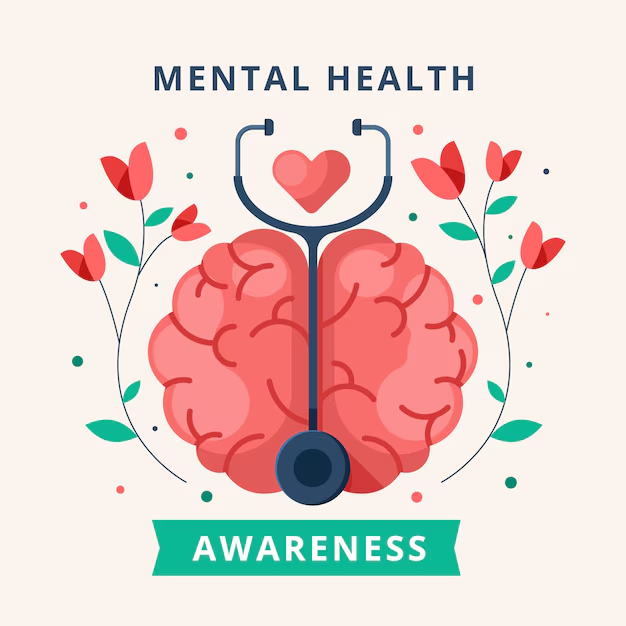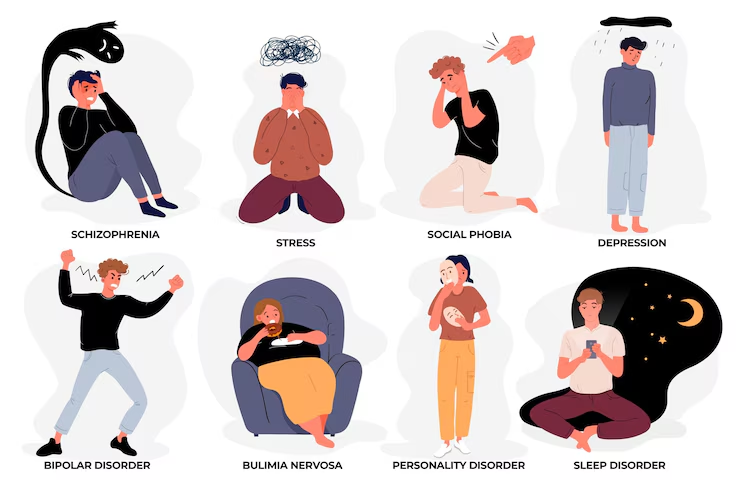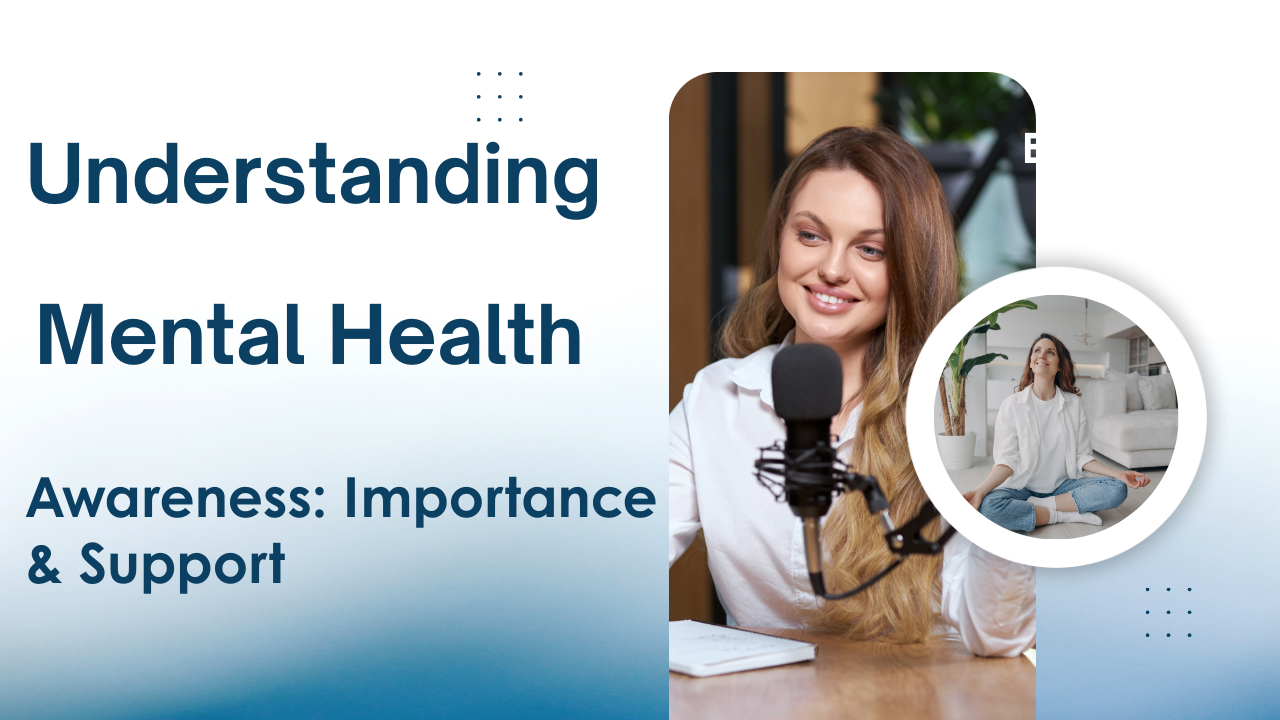Mental health is a vital aspect of our overall well-being, shaping how we think, feel, and behave. However, for many years, mental health issues were overlooked, misunderstood, or stigmatized. Today, mental health awareness is more important than ever, as it helps society recognize the significance of mental health and the need for support.
Mental health awareness goes beyond identifying symptoms; it’s about educating people, reducing stigma, and offering assistance to those in need. By fostering open conversations, we can create a more supportive environment for individuals facing mental health challenges. This shift is crucial in ensuring that mental health is prioritized as much as physical health.
In recent years, the conversation around mental health has evolved significantly. While progress has been made, more work remains to be done. Promoting mental health awareness and providing resources for those in need can make a lasting difference in improving mental well-being for individuals and communities alike.
What is Mental Health Awareness ?

Mental health awareness is the recognition, understanding, and acceptance of mental health issues. It highlights the importance of mental well-being and helps identify common mental health disorders that many people face. The goal is to reduce the stigma surrounding these conditions, allowing for more open and compassionate conversations.
Increased mental health awareness plays a crucial role in educating society about available resources for those struggling with mental health issues. It also emphasizes the need for better support in communities, workplaces, and schools.
When people are more informed, they are more likely to seek help at an early stage, leading to better prevention and treatment of mental health conditions. This proactive approach can significantly improve outcomes for individuals facing mental health challenges.
Ultimately, mental health awareness creates an environment where people feel comfortable discussing their struggles without fear of judgment, helping to build a more supportive and compassionate society.
The Importance of Mental Health Awareness
- Breaking the Stigma
One of the biggest obstacles to seeking help for mental health issues is the stigma attached to them. For years, mental health conditions were seen as signs of weakness, or people simply didn’t understand how they affected individuals. This stigma has kept many from seeking the support they need.
Raising mental health awareness is key to breaking down these barriers. As people become more informed about the realities of mental health, it becomes easier for those struggling to speak up. With increased mental health awareness, we can create more supportive and non-judgmental environments, allowing individuals to seek help without fear of discrimination.

- Encouraging Early Intervention
Mental health issues often go undiagnosed, and when identified, it can sometimes be too late for effective intervention. Early detection is crucial to improving outcomes and ensuring individuals get the support they need.
Mental health awareness plays a key role in helping people recognize the early signs of mental distress in themselves or others. With increased awareness, individuals can seek help sooner, leading to quicker intervention and more effective treatment. By promoting mental health awareness, we can encourage early recognition and provide the necessary support for better mental well-being.
- Improving Public Health
The societal impact of mental health issues is significant and far-reaching. Conditions such as anxiety, depression, and substance use disorders contribute to high rates of disability, absenteeism, and reduced productivity, affecting both individuals and communities.
Raising mental health awareness is crucial in addressing these public health challenges. By encouraging people to prioritize their mental well-being, just as they would their physical health, we can reduce the stigma surrounding mental health and promote early intervention. With greater awareness, individuals can better manage their mental health, leading to healthier, more productive lives and a positive impact on society as a whole.
- Fostering Inclusivity and Support
Mental health awareness helps to create a more inclusive and compassionate society. As awareness grows, so does the understanding that mental health challenges do not discriminate—they can affect anyone, regardless of age, gender, race, or background. Promoting mental health awareness fosters a sense of unity and support, making it easier for people to come together to support those in need.
The Role of Education in Mental Health Awareness
Education plays a pivotal role in promoting mental health awareness. Schools, universities, and workplaces all have a unique opportunity to educate individuals about mental health. By integrating mental health education into curricula and creating open dialogue about mental well-being, we can ensure that individuals are better equipped to manage their own mental health and provide support to others.
School-Based Mental Health Education
Schools play a vital role in fostering mental health awareness among students. By introducing mental health education at a young age, students learn to recognize and manage emotions, cope with stress, and build resilience. Early education on mental health helps students understand their well-being and develop healthy coping strategies for anxiety, stress, and other challenges.
School-based mental health programs also create a supportive environment where students feel safe discussing their mental health. These initiatives encourage students to seek help when needed, providing crucial resources during a time when mental health issues often emerge—adolescence. Integrating mental health awareness in schools promotes overall well-being and builds lifelong skills.
Workplace Mental Health Education
Workplace mental health education is essential for promoting employee well-being. Many adults experience work-related stress, which can negatively impact their mental health. Employers and employees alike benefit from mental health awareness programs that focus on stress management, work-life balance, and overall mental well-being.
Mental health education in the workplace can include stress management workshops, counseling services, and resources for coping with job-related challenges. These initiatives help prevent burnout, reduce mental health issues, and improve overall job satisfaction. A workplace that prioritizes mental health creates a supportive environment, fostering productivity and a happier, healthier workforce.

Public Campaigns and Media Involvement
Public campaigns and media play a significant role in raising mental health awareness. Celebrities, influencers, and health organizations are using their platforms to share personal stories, encourage open conversations, and reduce the stigma around mental health. This visibility helps normalize discussions about mental health struggles and promotes understanding.
Television, movies, and documentaries portraying mental health in a realistic and empathetic way help break down misconceptions and foster a broader understanding of mental well-being. Social media campaigns also reach wider audiences, especially younger generations, spreading mental health awareness and encouraging more people to speak out and seek help.
Common Mental Health Disorders
There are several common mental health disorders that many individuals may face throughout their lives. Mental health awareness involves understanding the signs and symptoms of these conditions, as well as the treatment options available. Some of the most common mental health conditions include:
Depression
Depression is one of the most common mental health disorders affecting people worldwide. It involves persistent feelings of sadness, hopelessness, and a lack of interest or motivation in daily activities. Depression can affect anyone, regardless of age or background, and may interfere with work, relationships, and daily life.
Mental health awareness about depression is essential to help people recognize its signs early. By understanding that depression is a medical condition, not a personal weakness, individuals can feel more comfortable seeking help. Promoting mental health awareness also helps reduce stigma and encourages open conversations about emotional well-being and treatment options.
Anxiety Disorders
Anxiety disorders include conditions like generalized anxiety disorder (GAD), panic disorder, and social anxiety disorder. These disorders are marked by constant worry, fear, and physical symptoms like racing heart or panic attacks that disrupt daily life. Anxiety can affect anyone and often leads to avoidance of social situations or responsibilities.
Mental health awareness plays a crucial role in helping people recognize anxiety symptoms before they escalate. Understanding these disorders can lead to early intervention and effective treatment. With greater mental health awareness, more people can access the support they need to manage anxiety and improve their quality of life.

Bipolar Disorder
Bipolar disorder causes extreme mood swings ranging from high-energy manic episodes to deep depressive lows. These shifts can affect sleep, energy levels, and decision-making, making everyday tasks difficult. Despite its challenges, bipolar disorder is manageable with proper treatment and support.
Mental health awareness is vital in recognizing the symptoms of bipolar disorder and reducing the stigma surrounding it. Educating the public helps foster empathy and encourages those affected to seek diagnosis and treatment. Increased mental health awareness ensures that individuals with bipolar disorder receive the care and understanding they deserve.
Post-Traumatic Stress Disorder (PTSD)
PTSD develops after someone experiences a traumatic event, such as an accident, assault, or disaster. Symptoms may include flashbacks, nightmares, severe anxiety, and emotional numbness. These symptoms can persist long after the trauma and disrupt daily functioning and relationships.
Raising mental health awareness about PTSD helps reduce stigma and promotes understanding of the condition. Survivors often struggle in silence, but with more awareness, they may feel safer seeking help. Mental health awareness ensures that PTSD is recognized as a serious issue and encourages the development of supportive, trauma-informed care environments.
Obsessive-Compulsive Disorder (OCD)
OCD is a mental health condition where individuals experience intrusive, unwanted thoughts (obsessions) and feel driven to perform repetitive behaviors (compulsions). These rituals temporarily relieve anxiety but often interfere with daily routines and relationships. OCD is more than just liking order or cleanliness—it can be deeply distressing.
Mental health awareness is key to dispelling myths about OCD and promoting early diagnosis. Increased awareness helps people understand that OCD is a medical condition requiring proper treatment. By promoting mental health awareness, we can encourage compassion, reduce stigma, and guide individuals toward professional support.
Eating Disorders
Eating disorders like anorexia, bulimia, and binge eating disorder involve unhealthy relationships with food and distorted body image. These disorders can lead to serious health complications and often stem from emotional distress or low self-esteem. They affect both physical and mental health.
Mental health awareness about eating disorders helps people recognize warning signs early and seek help. Education reduces stigma and encourages supportive conversations about food, body image, and emotional well-being. With greater mental health awareness, individuals are more likely to access the resources and treatment needed for recovery.
How to Promote Mental Health Awareness
Promoting mental health awareness takes a collective effort from individuals, communities, organizations, and governments. Everyone can play a role by starting conversations, sharing resources, and supporting those in need. Encouraging mental health awareness in your community helps reduce stigma, fosters understanding, and ensures more people feel safe seeking help and accessing the support they deserve.
Start the Conversation
Talking openly about mental health is a powerful way to reduce stigma and promote mental health awareness. Start conversations with friends, family, and coworkers about emotional well-being, stress, and mental health experiences. Sharing your own story can encourage others to speak up and seek help when needed.
Mental health awareness grows when people realize they’re not alone. Open discussions normalize mental health struggles and build supportive environments where others feel safe being vulnerable. By simply talking and listening, you help break the silence and encourage a culture of empathy and acceptance around mental health.
Advocate for Mental Health Resources
Advocating for better access to mental health resources is vital for community well-being. Push for services like affordable counseling, crisis hotlines, and support groups in schools, workplaces, and neighbor hoods. Raising your voice helps ensure that mental health support is available to everyone, regardless of their background or income.
Supporting policies and initiatives that increase mental health funding and improve care quality is essential. Through advocacy, you contribute to long-term solutions and show a commitment to mental health awareness, helping build a more compassionate, responsive society for those in need.
Be Supportive and Empathetic
Supporting someone with a mental health challenge starts with empathy. Be present, listen without judgment, and show understanding when a loved one opens up. Often, just knowing someone cares and is willing to help can make a major difference in their healing journey.
Promoting mental health awareness includes creating safe spaces for others to express their feelings. Encourage professional help when needed and offer emotional support along the way. Kindness, patience, and compassion are key in helping others feel seen, heard, and valued.

Participate in Mental Health Awareness Events
Taking part in events like awareness walks, fundraisers, or community talks can significantly boost mental health awareness. These activities unite people in support of emotional well-being and help spread education and resources to wider audiences.
Participating in mental health campaigns shows solidarity and encourages more open discussions. Whether you volunteer, donate, or simply attend, your involvement contributes to breaking stigma and promoting healthier attitudes toward mental health in your community.
Educate Yourself and Others
Learning about mental health conditions, symptoms, and treatment options is an important step in fostering understanding. Educating yourself allows you to recognize warning signs in yourself and others, helping promote early intervention and support.
Sharing this knowledge strengthens mental health awareness in schools, workplaces, and communities. By spreading accurate information, you help replace myths with facts, reduce fear, and encourage more people to seek the help they need without shame.
Conclusion
Mental health awareness is a vital aspect of improving the overall well-being of individuals and communities. By promoting understanding, education, and open dialogue about mental health, we can reduce stigma, encourage early intervention, and ensure that everyone has access to the support they need. As we continue to push for better mental health care and resources, we can create a world where mental health is just as important as physical health. Let’s keep the conversation going and work together to build a more supportive and compassionate society for everyone.
FAQs
- What is mental health awareness ?
Mental health awareness refers to understanding and recognizing mental health issues, and realizing that mental well-being is just as important as physical health. It’s about breaking the stigma that surrounds mental health disorders, educating people about common conditions, and encouraging open conversations. When we are more aware of mental health, we can create a supportive environment where individuals are not afraid to talk about their struggles or seek help when needed. - Why is mental health awareness important ?
Mental health awareness is important because it helps to remove the stigma and misunderstandings surrounding mental health. Many people still feel ashamed or embarrassed to talk about their mental health, and this prevents them from seeking help. When we raise awareness, it makes it easier for people to recognize mental health problems in themselves or others, and get the support they need early on. It also helps us understand that mental health issues are not a sign of weakness, but a part of being human. The more we talk about mental health, the more we can support one another and improve the overall well-being of our society. - How can I promote mental health awareness in my community ?
Promoting mental health awareness in your community starts with having open conversations about it. When we talk about mental health, it helps others feel comfortable doing the same. You can educate people by sharing information about mental health conditions and treatments, or simply by listening to others who may be struggling. Participating in mental health campaigns or events is another way to raise awareness. Even small acts, like encouraging someone to seek professional help or letting them know you’re there to listen, can make a big difference. Ultimately, it’s about creating a community where everyone feels safe to talk about mental health without fear of judgment. - What are the most common mental health disorders ?
Some of the most common mental health disorders include depression, anxiety, bipolar disorder, and PTSD. Depression often involves feeling persistently sad or empty, and losing interest in things you once enjoyed. Anxiety can cause excessive worry or panic attacks, making daily activities difficult. Bipolar disorder is characterized by extreme mood swings, from feeling very high and energetic (mania) to feeling very low (depression). PTSD occurs after experiencing a traumatic event, and it can cause flashbacks, nightmares, or emotional distress. There are also conditions like obsessive-compulsive disorder (OCD), where people have uncontrollable thoughts and repetitive behaviors, and eating disorders, where someone may develop unhealthy relationships with food or body image. - How can I support someone struggling with mental health issues ?
If someone you know is struggling with mental health issues, the best way to support them is by being there for them and listening without judgment. Sometimes, just having someone to talk to can make a big difference. You can encourage them to seek help from a mental health professional, like a therapist or counselor, and offer to help them find resources if needed. It’s important to avoid giving advice unless they ask for it, and instead, focus on being empathetic and understanding. Let them know you’re there for them, and that they are not alone. Sometimes just showing that you care can be the most supportive thing you can do.


